Sector-specific Cash and Voucher Assistance
CVA can help people in crises address their needs within a specific humanitarian sector, such as water, food, health, shelter, livelihood, or protection. Sector-specific CVA can be restricted or unrestricted, and conditional or unconditional, and will typically be provided as part of a comprehensive package which may also include in-kind and service-based assistance.
Each sector has to consider different questions, challenges, advantages and risks when it comes to supporting people’s recovery within their area of expertise. This requires evidence, tools, guidance and capacity. Meeting sector-specific outcomes through CVA also requires a multi-sectoral understanding of needs and of household economic security – see Multipurpose Cash Assistance. While some sectors are very experienced in implementing CVA and have done so for many years, others are now catching up. Most humanitarian sectors are committed and have been increasing their efforts on sector-specific CVA. The Global Cluster Coordination Group (GCCG) is also coordinating cross-cluster work to improve the sectoral used of CVA.
Current priorities
The CALP Network works closely with the cash technical groups/task teams within the global clusters, who have been defining their 2020 priorities and workplans during their regular meetings. A general overview and specific details of these priorities across each global cluster is available here.
Sector-specific CVA subpages
Camp Coordination, Camp Management and Cash and Voucher Assistance
Page
Find out more about Camp Coordination and Camp Management (CCCM) in relation to Cash and Voucher Assistance (CVA). For the most up to date information visit the Global CCCM Cluster’s website.
Education and Cash and Voucher Assistance
Page
A brief introduction as to how Cash and Voucher Assistance (CVA) can support education outcomes. For the most up to date information please visit the Global Education Cluster’s website.
Food Security and Cash and Voucher Assistance
Page
A brief introduction as to how Cash and Voucher Assistance (CVA) can support food security outcomes. For the most up to date information please visit the Food Security Cluster Cash and Market Working Group web page.
Health and Cash and Voucher Assistance
Page
The content on this webpage has been developed with the Global Health Cluster.
Nutrition and Cash and Voucher Assistance
Page
Malnutrition continues to pose a major challenge to human well-being around the world. In 2020, an estimated 144 million children under five suffer from stunting (i.e. chronic malnutrition) , 47 million children under five were wasted (i.e. acute malnutrition) , of which 14.3 million were severely wasted, and an additional 340 million suffered from micronutrient deficiencies (UNICEF/WHO/WB...
Protection and Cash and Voucher Assistance
Page
How can Cash and Voucher Assistance (CVA) support protection outcomes? Please find a brief summary below, and for the very latest information, refer to the Global Protection Cluster Task Team on Cash for Protection.
Shelter and Cash and Voucher Assistance
Page
How can Cash and Voucher Assistance (CVA) support shelter outcomes? Please find a brief summary below, and for the very latest information, refer to the Shelter and Cash Working Group.
WASH and Cash and Voucher Assistance
Page
How can Cash and Voucher Assistance (CVA) support WASH outcomes? Please find a brief summary below, and for the very latest information, refer to the WASH Cluster’s Cash and Markets Technical Working Group.
Latest
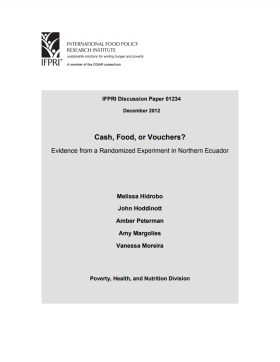
Cash, Food, or Vouchers? Evidence from a randomized experiment in Northern Ecuador
Report
The debate over whether to provide food assistance and the form that this assistance should take has a long history in economics. Despite the ongoing debate, little rigorous evidence exists that compares food assistance in the form of cash versus in-kind. This paper uses a randomized evaluation in...
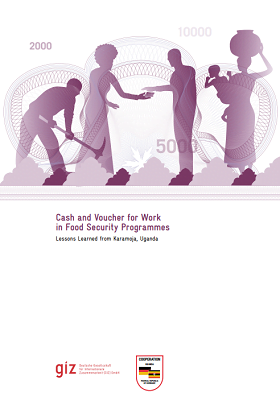
Cash and Voucher for Work in Food Security Programmes: Lessons learned from Karamoja, Uganda
Case Study
This report examines a Deutsche Gesellschaft für Internationale Zusammenarbeit (GIZ) GmbH supported labour-intensive cash for work and voucher for work project which was implemented in the framework of GIZ’s Food and Nutrition Security and Conflict Management Project (FNS) in Karamoja. The FNS project...
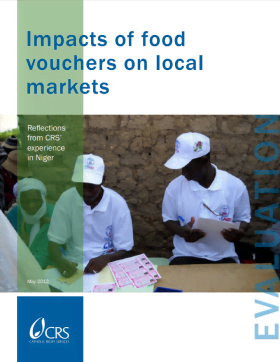
Impacts of Food Vouchers on Local Markets: Reflections from CRS’ experience in Niger
Report
In mid 2010, CRS-Niger designed and carried out a food voucher program to assist the most needy one-third of households in the departments of Ouallam and Tillabéri due to the poor harvest in 2009 (CRS, 2010). The ADVANCE project was implemented in collaboration with a local NGO partner Association pour...

Meta-Evaluation of ACF Fresh Food Voucher Programmes
Report
ACF commissioned a meta-evaluation of five of its fresh food voucher programmes implemented between 2009-2011 during emergencies in Bolivia, Dadaab refugee camps in Kenya, Haiti, Pakistan and the occupied Palestinian Territories (oPT). The programmes were all paper cash vouchers exchanged for fresh foods...
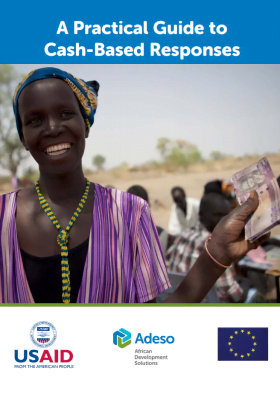
A Practical Guide to Cash-Based Response
Guidelines and Tools
A Practical Guide to Cash-based Responses is a manual developed by Adeso to share the organisation’s experience in developing and implementing appropriate cash-based responses. The manual highlights some practical problems that are faced by implementation teams around the world and it is intended to...
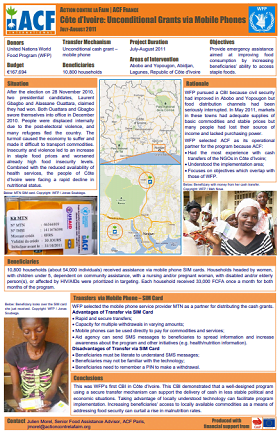
ACF Côte d’Ivoire: Unconditional grants via mobile phones (poster)
Report
This one-pager (poster) provides an overview of ACF’s experience transferring cash by mobile phone in the Ivory Coast (a WFP programme).

Logistics and Administration Guideline for Cash Based Interventions
Guidelines and Tools
Cash-based interventions (CBIs) are increasingly included in humanitarian relief efforts as alternatives or complements to in-kind assistance. This guideline is mainly dedicated to logisticians and administrators to successfully support CBIs but also to technical departments. The objectives of this...

ACF Meta Evaluation: Fresh food vouchers (poster)
Report
This one-page poster shows a summary of the meta evaluation of 5 Fresh Food Voucher programmes in Bolivia, Haiti, Daadab Kenya, the oPT and Pakistan.
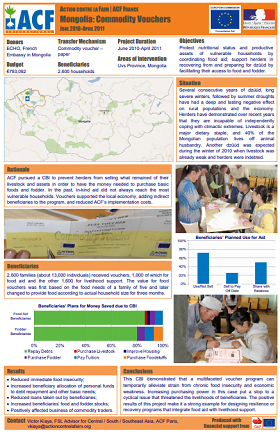
ACF Mongolia Commodity Vouchers (Poster)
Report
This one-page poster provides an overview of ACF’s commodity voucher programme in Mongolia.

Impact Evaluation of Cash, Food Vouchers, and Food Transfers among Colombian Refugees and Poor Ecuadorians in Carchi and Sucumbíos
Report
This report is the final impact evaluation of the World Food Programme’s Food, Cash, and Voucher intervention and contains analysis on outcomes including food security, social capital, anemia, and gender issues. Due to the targeting of Colombian refuges and poor Ecuadorians in Northern Ecuador, it also...
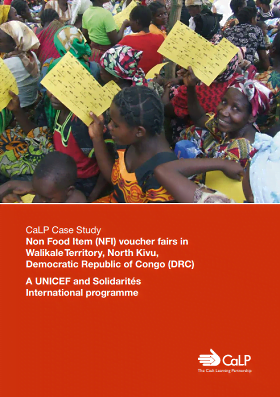
Non Food Item (NFI) Voucher Fairs in Walikale Territory, North Kivu, DRC (the CALP Network Case Study)
Case Study
In response to a rapid-onset emergency, UNICEF and Solidarités International utilized a cash-based voucher approach in Nyasi and Bobolo villages, in Walikale Territory, North Kivu, Democratic Republic of Congo (DRC). As part of a larger multi-province, multi-partner response programme in DRC known as...

The Impact of Cash Transfers on Nutrition in Emergency and Transitional Contexts – Synthesis paper
Report
Cash transfer programming is now widely accepted as a way to meet a variety of needs in humanitarian and transitional settings. Although the literature on cash transfers has grown exponentially over the last few years, as has their use in humanitarian interventions, the relationship between cash transfer...
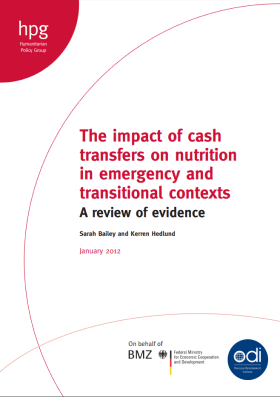
The Impact of Cash Transfers on Nutrition in Emergency and Transitional Contexts – Review of evidence
Report
This ODI / HPG commissioned report reviews the evidence of the impact of cash transfers on nutrition in emergency and transitional contexts. The research finds that evidence from humanitarian evaluations makes a strong case that cash transfers often improve dietary intake. There is less evidence that cash...
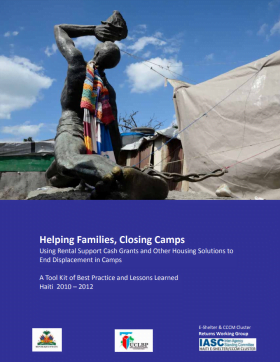
Helping Families, Closing Camps: Using rental support cash grants and other housing solutions to end displacement in camps
Guidelines and Tools
Rental Support Cash Grants have enabled over 14,000 families to move from Haiti’s displacement camps into safe housing. Since October 2010, ten months after the January 12th earthquake, these grants of $500 US Dollars covering one year of rent have proven to be a fast, effective and relatively...
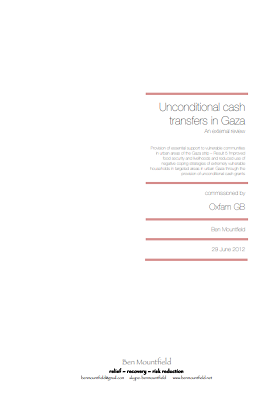
Unconditional cash transfers in Gaza: an external review
Report
This is a review of small pilot project, which targets extremely vulnerable households with monthly unconditional cash transfers for a limited period. The target population is made up of two groups, one group already receiving assistance through a voucher from WFP but still showing poor food diversity...

Examining Differences in the Effectiveness and Impacts of Vouchers and Unconditional Cash Transfers
Report
The objective of this study is to examine the differences in the effectiveness and impacts of vouchers versus unconditional cash transfers in the Bushani camp of the Masisi territory of the Democratic Republic of Congo. As part of this research, the study team collected household data from over...
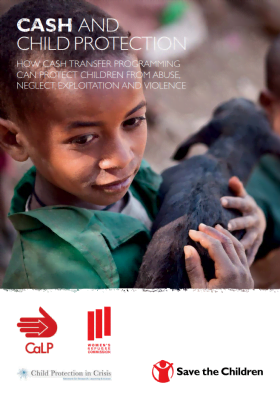
Cash and Child Protection: How cash transfer programming can protect children from abuse, neglect, exploitation and violence
Guidelines and Tools
This discussion paper examines the links between cash transfers and the positive and negative outcomes for children – in particular, the role cash transfers have played in protecting children from abuse, neglect, exploitation and violence. It aims to identify ways in which cash transfer activities could...

Kenya: Cash grants to support post-election violence livelihood recovery
Case Study
In response to post-election violence starting in late December 2007, ACF implemented a cash-based intervention in Nakuru, South Rift Valley, Kenya. This programme supported the local displaced and host population, who had been excluded from aid provided to internally displaced persons (IDPs) living in...
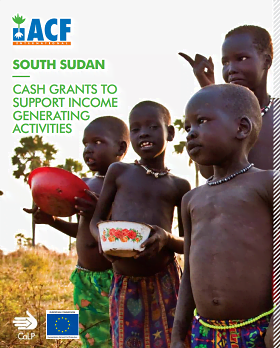
South Sudan: Cash grants to support income generating activities
Case Study
In response to chronic malnutrition, ACF implemented a cash-based intervention in Twic and Gogrial West Counties of Warrap State, South Sudan, using group cash grants to promote income generating activities. The programme addressed chronic livelihood vulnerability, which is a contributing factor to global...

USAID Guidelines for Proposal
Report
USAID’s Office of U.S. Foreign Disaster Assistance (USAID/OFDA) has revised its Guidelines for Proposals in accordance with updated USAID requirements and the changing global humanitarian context in 2012. These Guidelines apply to new awards as well as to modifications of existing awards. The...